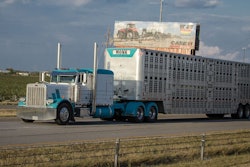A bill filed in the U.S. House on Thursday would, if made law, institute reforms to hours of service regulations for some segments of the industry and allow the Federal Motor Carrier Safety Administration to move more quickly on any rulemaking meant to provide drivers with split sleeper berth flexibility. It also would pare down the number of supporting documents drivers are required to maintain under the electronic logging device mandate.
The legislation is the latest in a string of bills proposed this year targeting hours of service reforms, spurred in part by the implementation of the ELD mandate. The Honest Operators Undertake Road Safety Act (HOURS Act, H.R. 6178) was introduced June 21 by Reps. Rick Crawford (R-Arkansas), Sanford Bishop (D-Georgia) and Bruce Westerman (R-Arkansas). It is the first hours reform bill this year to be backed by the American Trucking Associations. ATA on Thursday announced its support for the legislation.
Like other hours reform bills introduced in recent weeks, the bill includes changes specific to the livestock and agriculture sector. However, the bill would only institute small reforms for such carriers, rather than an outright overhaul of HOS regs. The HOURS Act would allow drivers hauling livestock and ag commodities to be exempt from hours of service limits and duty status records year around if operating within a 150 air-mile radius of the source of their livestock or ag product, rather than only during state-designated harvesting and planting seasons.
The HOURS Act also would cut the number of supporting documents drivers are required to keep on hand to verify the accuracy of their electronic logs. Current regulations require drivers to maintain at least eight supporting documents for their 24-hour work period, which includes documents like fuel receipts, bills of lading and dispatch records. The HOURS Act would cut that to just two documents — one to verify the start of their work day and one to verify the end of it.
Relative to split sleeper berth flexibility within hours of service regulations, the bill would allow FMCSA to skip a step in the formal rulemaking process should the agency pursue a rule to allow drivers to split their off-duty sleeper berth time into segments. Current regulations only allow drivers to split their sleeper berth time into segments of 8 hours and 2 hours, for the required 10-hour off-duty period every 24 hours. But FMCSA, via a pilot program, is studying the feasibility of allowing more flexible split sleeper options, such as splits of 7-3, 6-4 and 5-5.
If the agency pursues a rule to alter split sleeper time, the HOURS Act would allow FMCSA to skip the advanced notice of proposed rulemaking stage and move directly to proposing the rule and accepting public comments.
Lastly, the HOURS Act would create a unified set of hours rules for short-haul drivers. It would allow all short-haul operators (defined in the bill as those operating within 150 air-miles of their work reporting location) to be exempt from hours regs and the ELD mandate if they complete their work day within a 14-hour period. Current regs only allow this for non-CDL drivers operating under the short-haul exemption.












